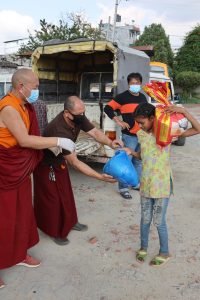Food relief for poor families in CoVid-19 Lockdown – Nepal

During these uncertain times following the emergence of the COVID-19 virus, Shenpen has worked earnestly to identify the best ways to help the poor and disadvantaged. The Nepal government has locked down the country to prevent community transmission of the coronavirus – only essential services like hospitals and food suppliers remain open.
“A prolonged shutdown forces us to look beyond […] the near future – food shortages, economic hardship, social unrest and political instability. The virus and its response have exposed and exacerbated existing socio-economic inequities in Nepali society, exclusion and injustice” (Nepali Times).
A daily laborer, Ram Nepali said: “Rich people have managed to store food and can now spend some time at home with their families. It’s like a vacation for them. But for working class people like us, if this situation continues for much longer, we will die of hunger” (The Kathmandu Post).
62% of people are employed in the informal sector and depend on daily labor work to pay for their food and lodging. The lockdown started on 24th March, and so far has been extended until early May. The disadvantaged desperately need help but the government lacks the financial budgetary resources to help many of those in need.
“Lockdown as a way of fighting Covid-19 has been a double-edged sword. While on the one hand, it has been effective in helping to contain the spread of the disease, on the other, it has put at risk many lives, especially the vulnerable population who earn on a daily basis to live a hand-to-mouth existence. Images of Nepalis who opted to walk for kilometres on end to reach their hometowns just so they will have a roof above their heads and some grain to help appease their burning stomach due to hunger have swamped the media.” (The Kathmandu Post).
Shenpen has already provided food and hygiene packages to support students who come under its School Meal Program and their families, and to families at risk in Kathmandu, helping to support between 100 and 200 families per week. There are many more families who need support across Kathmandu, and Shenpen plans to expand its scope to provide food hampers to 1,000 families per month.
This project prevented hunger and starvation, improved hygiene, strengthened community solidarity, and the local economy.
Shenpen had the material means (jeep, store rooms, office), human resources (volunteers), and logistic resources (local suppliers, functional administration’s system, etc.) to implement such activities. Its direct contact with poor families in Kathmandu means the organization could reach a considerable number of families in a short period of time, and ensured follow up monitoring.
Recent News:
No recent updates.











